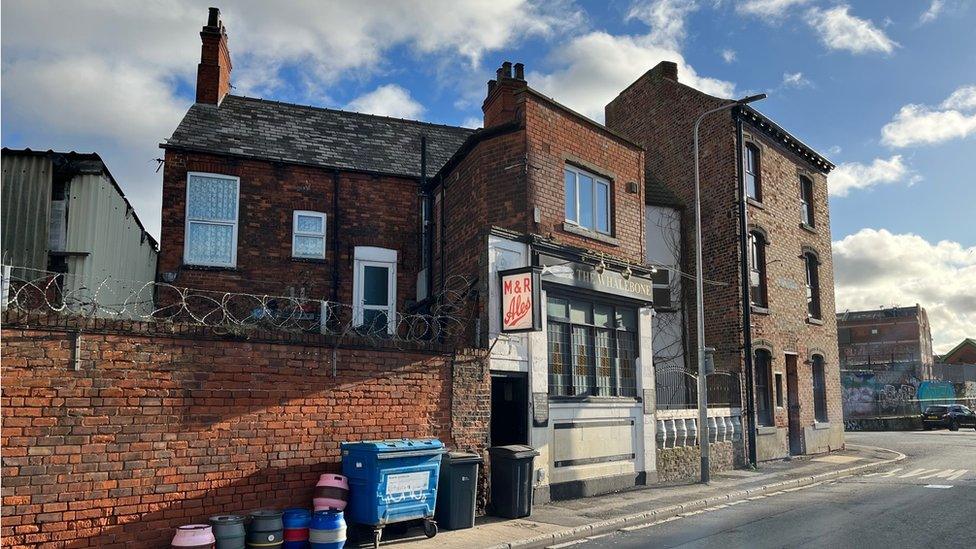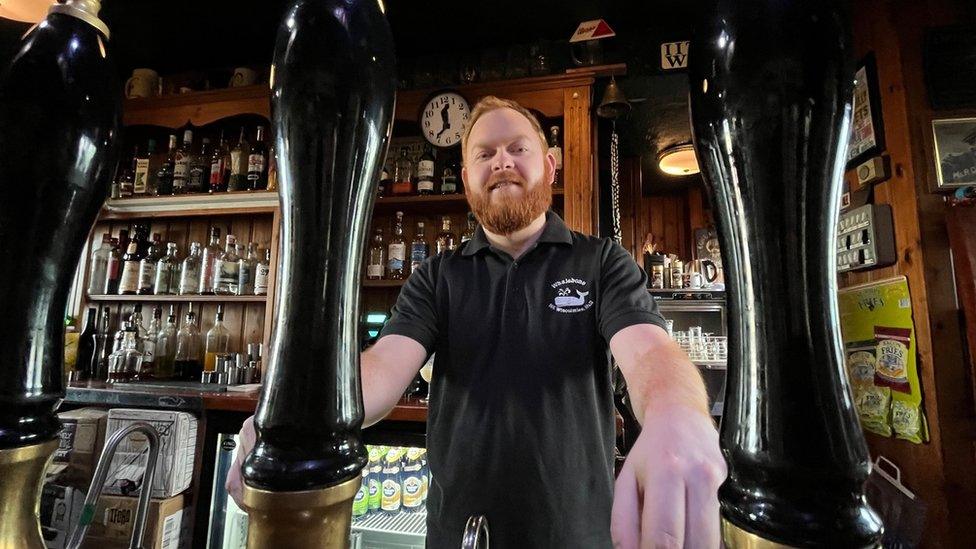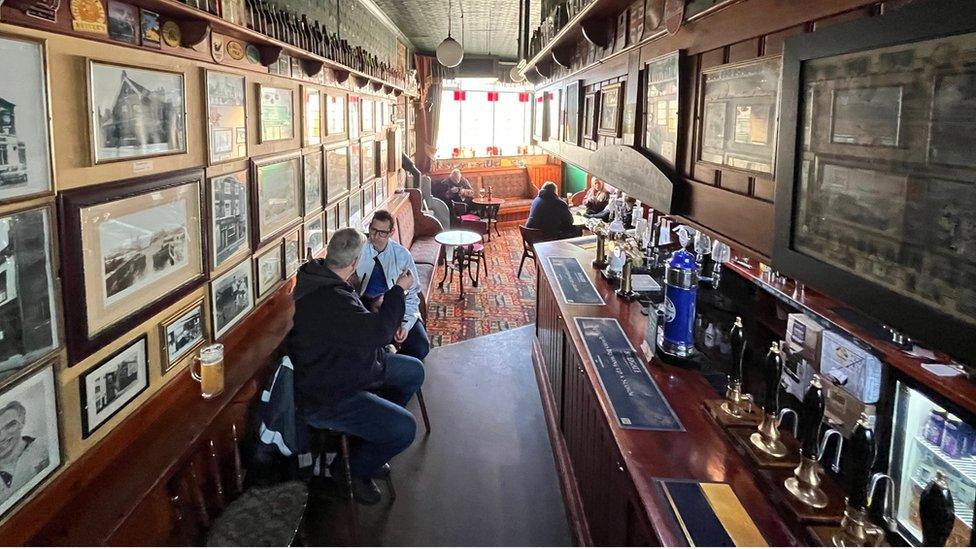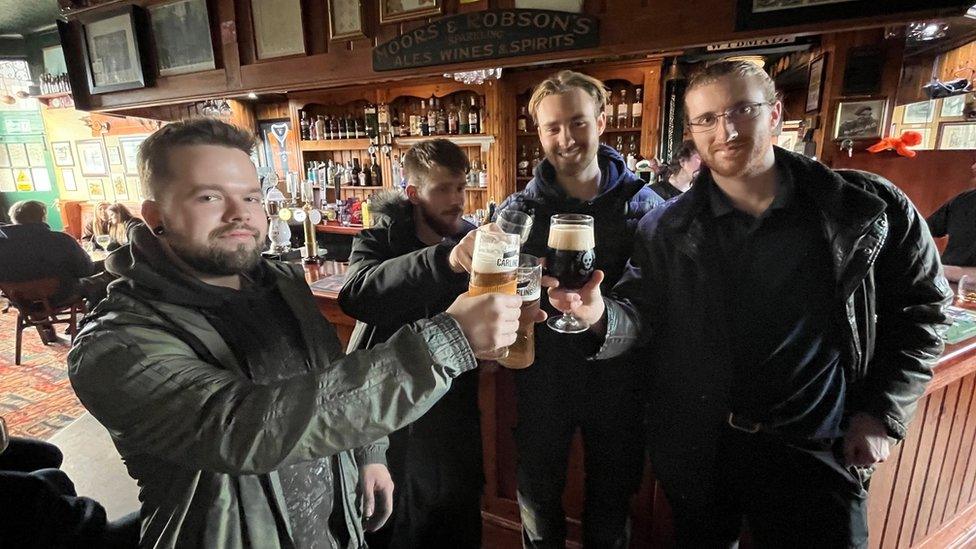The Whalebone pub in Hull will stay traditional, says outgoing landlord
- Published

The Whalebone pub, in Hull, will remain a traditional pub under new management, says the outgoing landlord
The landlord of one of Hull's oldest and best-known pubs has quashed rumours the traditional venue will be transformed into a sports bar. As The Whalebone prepares for life under new management, BBC News' Kevin Shoesmith went along to speak to the outgoing landlord and patrons.
Raucous laughter spills from the snug, where a group of young men, in high-vis jackets, are enjoying a lunchtime pint of ale, as landlord James Reading stands at the bar chatting with Pat Brady, one of his regulars.
Pat wears a yellow Stagecoach jacket over a navy uniform. He's called in for a quick drink after clocking-off for the day.
The publican laughs and jokes with his customers; after 12 years pulling pints here James has fine-tuned his 'front of house' face. But his frequent, darting glances to other familiar faces and photographs on the wall charting the pub's history reveal chinks in the armour.
"It is emotional," James admits, as we leave the bar and head to a quiet corner table. "It's been a major part of my life for many years. It's been a privilege. I am really fortunate to have been custodian of The Whalebone. I am really going to miss it."

Outgoing landlord James Reading says it has been a privilege running one of Hull's best-known pubs
James will shortly call time on his eight years at the helm of this 18th Century, two-room pub. He previously worked as the pub's cellar manager before being promoted to head brewer by then-landlord, the late Alex Craig.
Rumours abound, fuelled by social media, that The Whalebone - named after the city's link to the whaling trade - is to become a sports bar when James hands over the reins.
But James tells me patrons can be assured The Whalebone is to remain a "traditional British pub" once it reopens. It is not yet known when the pub, which closes on Sunday, will reopen under new management.
That matter cleared up, James tells me what he will miss most about this place. "It's the people," he says, exhaling. "The staff, the customers. People say this is the best pub in Hull."
Over the years, Campaign for Real Ale (Camra) members have agreed, crowning it Best Pub five times under James.
"I'm a beer snob," James admits. "Being freehold, I've been able to look all over the world for the best beers."

Drinkers enjoy a lunchtime pint at The Whalebone
Aged 32, James confesses he is not your stereotypical publican. "I was 24 when I became a landlord," he says. "But I've not tried to be anything I'm not. I'm very relaxed, I've trained my staff well and trust them."
Images of long-closed pubs are displayed on the wall next to Hull City memorabilia, including a framed programme from prolific striker Ken Wagstaff's 1975 testimonial match at Boothferry Park.
Like every pub, The Whalebone is not immune from the threat posed by cheap supermarket beer. Nestled in Wincolmlee, an industrial estate on the banks of the River Hull, James says the team have had to work hard over the years to pull in the punters.
"The walk from the Old Town to other pubs like the Minerva is a nice one, passing the pretty marina," he says. "But the walk from Old Town to here is through the middle of an industrial estate."
On the table next to us is Mick, a 65-year-old ground worker. I find him him leafing through a kitchen brochure while supping a pint of Blue Moon. I ask him how long he has been coming here. "How long have I been coming here, James? he asks. "Nine-and-a-half years, Mick," responds the landlord instantly.
"James has put a lot into this place," he says. "He listens to his customers. We said we wanted a dark ale, he got one in, it did really well, now there's two."
Mick tells me Pat, the bus driver at the bar, is the man to speak to in order to get a good flavour of The Whalebone.
"The second you walk through that door, your troubles and stresses go," he says, smiling. "The ale, the staff, the people - it's all spot on."
Jon Major, from Hull and East Yorkshire Camra, says it's "extremely important" traditional pubs such as The Whalebone continue. "They're taken a massive hit in recent years," he says. "For real ale and real cider, you can't beat the place."
Hull author and historian Paul Gibson discovered how, in the early 1800s, dozens of whaling ships discharged their cargo in yards close to the pub. He hopes the future will be kind to The Whalebone.
"The Whalebone has closed several times before, and then had new life breathed into it, and I'm sure that it will do so again," he says. "The recent tenants and staff have done a marvellous job keeping standards up and making it last this long."

James Nell, pictured far right, hopes the pub will not change too much under new management
Another group of young men are waiting to be served.
James Nell, 26, offers a glimmer of hope to the nation's licensees, telling me: "Younger people still want to go to the pub. There's no fun in drinking at home."
He has a message for the new owners. "If it changes too much, people will stop coming."

Follow BBC East Yorkshire and Lincolnshire on Facebook, external, Twitter, external, and Instagram, external. Send your story ideas to yorkslincs.news@bbc.co.uk, external.
- Published9 May 2022
